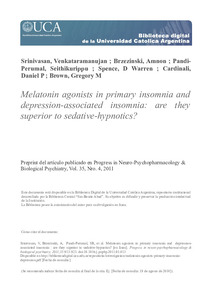Por favor, use este identificador para citar o enlazar este ítem:
https://repositorio.uca.edu.ar/handle/123456789/1609| Título: | Melatonin agonists in primary insomnia and depression-associated insomnia : are they superior to sedative-hypnotics? | Autor: | Srinivasan, Venkataramanujan Brzezinski, Amnon Pandi Perumal, Seithikurippu R. Spence, David Warren Cardinali, Daniel Pedro Brown, Gregory M. |
Palabras clave: | MELATONINA; AGONISTAS; INSOMNIO; DEPRESION | Fecha de publicación: | 2011 | Editorial: | Elsevier | Cita: | Srinivasan, V., et al. Melatonin agonists in primary insomnia and depression-associated insomnia : are they superior to sedative-hypnotics? [en línea]. Preprint de artículo publicado en Progress in Neuro-psychopharmacology & Biological Psychiatry. 2011, 35. doi:10.1016/j.pnpbp.2011.03.013. Disponible en: https://repositorio.uca.edu.ar/handle/123456789/1609 | Resumen: | Abstract: Current pharmacological treatment of insomnia involves the use of sedative-hypnotic benzodiazepine and non-benzodiazepine drugs. Although benzodiazepines improve sleep, their multiple adverse effects hamper their application. Adverse effects include impairment of memory and cognitive functions, nextday hangover and dependence. Non-benzodiazepines are effective for initiating sleep but are not as effective as benzodiazepines for improving sleep quality or efficiency. Furthermore, their prolonged use produces adverse effects similar to those observed with benzodiazepines. Inasmuch as insomnia may be associated with decreased nocturnal melatonin, administration of melatonin is a strategy that has been increasingly used for treating insomnia. Melatonin can be effective for improving sleep quality without the adverse effects associated with hypnotic-sedatives. Ramelteon, a synthetic analog of melatonin which has a longer half life and a stronger affinity for MT1 and MT2 melatonergic receptors, has been reportedly effective for initiating and improving sleep in both adult and elderly insomniacs without showing hangover, dependence, or cognitive impairment. Insomnia is also a major complaint among patients suffering from depressive disorders and is often aggravated by conventional antidepressants especially the specific serotonin reuptake inhibitors. The novel antidepressant agomelatine, a dual action agent with affinity for melatonin MT1 and MT2 receptors and 5-HT2c antagonistic properties, constitutes a new approach to the treatment of major depressive disorders. Agomelatine ameliorates the symptoms of depression and improves the quality and efficiency of sleep. Taken together, the evidence indicates that MT1 / MT2 receptor agonists like ramelteon or agomelatine may be valuable pharmacological tools for insomnia and for depression-associated insomnia. | URI: | https://repositorio.uca.edu.ar/handle/123456789/1609 | ISSN: | 0278-5846 | Disciplina: | MEDICINA | DOI: | 10.1016/j.pnpbp.2011.03.013 | Derechos: | Acceso Abierto | Fuente: | Progress in Neuro-psychopharmacology & Biological Psychiatry. 2011, 35 |
| Aparece en las colecciones: | Artículos |
Ficheros en este ítem:
| Fichero | Descripción | Tamaño | Formato | |
|---|---|---|---|---|
| melatonin-agonists-primary-insomnia-depression.pdf | 473,5 kB | Adobe PDF |  Visualizar/Abrir |
Visualizaciones de página(s)
184
comprobado en 30-abr-2024
Descarga(s)
797
comprobado en 30-abr-2024
Google ScholarTM
Ver en Google Scholar
Altmetric
Altmetric
Este ítem está sujeto a una Licencia Creative Commons

